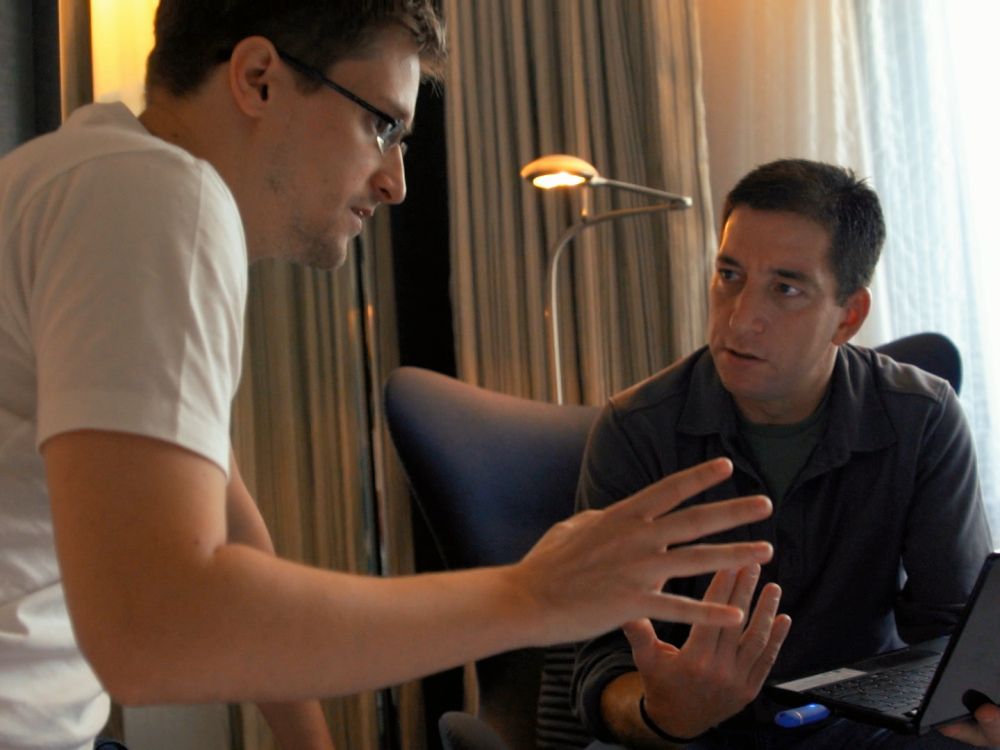
In 2012, documentary filmmaker Laura Poitras went public with her Homeland Security troubles. The director of two highly regarded documentaries concerning the War on Terror, one focusing on an Iraqi doctor (2006’s My Country, My Country) and the other on two former Al-Qaeda functionaries (2010’s The Oath), Poitras apparently worried the American government enough to be detained at airports on several dozen occasions. Wary of jeopardizing the integrity of her subjects and footage, Poitras relocated to Berlin. Even knowing this, it was still a little jolting to see her name attached to the video interview with Edward Snowden that surfaced a few days after journalist Glen Greenwald began reporting stories based on the former NSA contractor’s incendiary leak. After years exploring the consequences of America’s drive for “national security,” here Poitras was at the very heart of revelations about the fate of civil liberties after 9/11. She had initially planned to follow The Oath with a documentary focusing on Guantanamo Bay, but as it turned out Citizenfour was the film only she could make.
It was already clear from My Country, My Country and The Oath that Poitras was willing to follow a difficult lead and unusually skilled at fashioning a clear narrative line without sacrificing the complexity of her subjects. Still, Snowden presents unique challenges. Beyond the practical risk of associating with a citizen charged under the Espionage Act, he’s subject to strongly entrenched opinions in the audience. Her solution is to cleave very closely to the weeklong encounter in a Hong Kong hotel room during which Snowden passed off his information and awaited the blowback: the same plot as a dozen whistleblower movies (most recently Kill the Messenger) but delivered here with a dreamlike clarity owing to real time. There are no old photographs or home movies to round out Snowden’s past, no cutaway shots of tattered American flags, no surging violins on the soundtrack—nothing to distract us from unfolding events.

That’s not to say that Citizenfour doesn’t leave us with a much fuller sense of Snowden’s character, only that this understanding is the result of direct observation rather than the psychological speculation typical of biopics. From the opening minutes of their meeting, Snowden’s meticulousness in preparing the transfer of information—as well as his determination to stand aside and let the press do its work—is readily apparent. In person he is concise, eloquent, and blessedly free of the messianic delusions of grandeur that bogs down other subversives (Julian Assange appears briefly arranging for Snowden’s asylum). Again and again, Snowden says this story should not about him, and indeed Poitras has structured the film so that before arriving in Hong Kong we’ve already seen clips of former NSA operator William Binney cautioning on the agency’s overreach; an Orwellian court trial regarding the government’s tracking phone calls in San Francisco; an Occupy Wall Street training session on the perils of “metadata in aggregate,” and the much-replayed footage of James Clapper lying under oath—all of which makes it clear that Snowden’s revelations did not come about in a vacuum.
As the Hong Kong group prepares for the release of Greenwald’s first stories and then of Snowden’s identity, the film’s structure comes to resemble that of the “crisis narratives” that characterized the first generation of cinéma-vérité (the hotel room setting is especially reminiscent of John F. Kennedy and staff awaiting election returns in 1960’s Primary). We know that Snowden eventually made it to Moscow, and yet Poitras’ deliberate pacing gives a vivid sense of the uncertainty of those days. Snowden expects men in black to burst through the door at any moment, with his paranoia peaking during a series of unannounced fire alarms. There’s a touch of Beckett in this slow burn of paranoia, and at times Citizenfour can be quite funny, never more so than when Snowden chides Greenwald for his lax security (“It looks like your root password is about four characters”).

Once Snowden exits the hotel room, Poitras’s film necessarily fragments: a cut from him preparing to leave with the mildest of disguises to a bird’s eye view of the city says it all. She tracks how the story plays out in media, public hearings, private meetings, and encrypted chats with Snowden. It’s only after watching the film that one realizes how many distinct strands of recent history Poitras has woven into this story: the Department of Justice’s increased use of the Espionage Acts, the erosion of an earlier age of internet utopianism, revelations of American spying on foreign populations and even their leaders, and, perhaps the real heart of the film, the betrayal of Obama’s idealistic campaign for president. The President only receives a few seconds of airtime in Citizenfour, a clip in which he condemns the Snowden leak, saying that the NSA’s actions were already being reviewed and calling for a “fact-based discussion”—which hardly seems credible when so many of the “facts” would have presumably remained classified if not for the whistleblower. Meanwhile, Snowden’s own hope that his actions might embolden other insiders seems to be validated by an epilogue that already has the newswires aflutter. It’s an uncharacteristically teasing scene for Poitras, but on the whole Citizenfour remains more impressive for its lucid storytelling than its sensational scoop.



